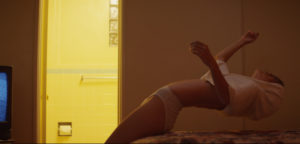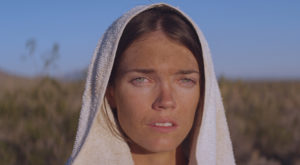 Review: One Night Only
Review: One Night Only
MA | Celia Rowlson-Hall | USA | 2015 | 80 minutes
Micro-Wave Cinema Series, 4070 Vilas Hall, Sunday, May 1, 7:00pm»
James Kreul looks at the concluding film in the Spring 2016 schedule for the Micro-Wave Cinema Series, Celia Rowlson-Hall’s MA. With her debut feature film Rawlson-Hall ventures into biblically inspired mythopoeia that works best when significance is embodied in movement and the body itself.
Before officially starting the review, let me point out a strategic error committed at the Madison Film Forum that we will correct in the coming year. By allocating almost all of our limited resources to our coverage of the Wisconsin Film Festival in March and April, we overlooked some important screenings and developments.
First, we should have dedicated more time and space to the WUD Marquee International Film Festival, especially Madison debuts like Liza the Fox Fairy and Office. The later was one of our Missed Madison Film Festival selections, so we should have called more attention to its debut in Madison.
Second, we should have dedicated more space to the Micro-Wave Cinema Series. We missed opportunities to preview two screenings, Here’s to the Future! (as we were combing through the Festival lineup in March) and Hit 2 Pass (as we delivered daily Festival reviews in April).
While we’re still committed to covering the Wisconsin Film Festival in depth, we will aim for more balance in 2017.
 The Micro-Wave Cinema Series concludes its Spring 2016 campaign with MA, directed by noted dancer and choreographer Celia Rowlson-Hall. Filmmaker Magazine named Rawlson-Hall one of the 25 New Faces of Independent Film in 2015, and it is a shame that more people in town won’t know about this screening as they continue to recover from the overload of the Wisconsin Film Festival (partially our bad, see above). The screening Sunday will be followed by a filmmaker Q & A via Skype.
The Micro-Wave Cinema Series concludes its Spring 2016 campaign with MA, directed by noted dancer and choreographer Celia Rowlson-Hall. Filmmaker Magazine named Rawlson-Hall one of the 25 New Faces of Independent Film in 2015, and it is a shame that more people in town won’t know about this screening as they continue to recover from the overload of the Wisconsin Film Festival (partially our bad, see above). The screening Sunday will be followed by a filmmaker Q & A via Skype.
The film begins with a series enigmatic images. A woman in tattered clothing (Rawlson-Hall) wanders the desert, and performs a ritual as she faces the rising sun. A man (Andrew Pastides) pulls over at a vacant truck stop to inspect his car, and discovers a long intertwined tangle of string or yarn stuffed in his exhaust pipe. Soon, of course, the paths of the man and woman meet on an empty stretch of desert highway, where the woman stands in the middle of the road with her arms outstretched. Instead of getting in the man’s car, however, the woman chooses to lie down on the car’s hood, and ride into town Zoe Bell style (at manageable speeds, of course).
All of this transpires without dialogue, as does all of the action in MA. While the plot does follow the archetype of a journey (Rawlson-Hall describes MA as “a modern day vision of Mother Mary’s pilgrimage”), far more important here is Rawlson-Hall’s focus on the body and movement. As with the early work of Yvonne Rainer, at times Rawlson-Hall collapses the distinction between ordinary movement and dance.
Highway motels become liminal, abstract spaces where the woman can viscerally respond to any stimulus around her. In one particularly striking moment early in the film, the woman responds to gunshots heard from a neighboring television by slowly falling backwards on to her motel bed. In the context of her journey, this childlike, playful response seems like a slow but urgent attempt to transform the sensory world into a meaningful ritual.
A woman at the next motel drops sand out of her dress like a prisoner of war disposing of dirt dug out of an escape tunnel. Our protagonists share a motel room, and the man offers the woman clean underwear to replace her tattered clothes. In the morning they engage each other with an almost primal sense of play as the morning sun splashes in through the curtained window. Sand eventually begins to creep into the room: first through a cheap motel painting, then through the bathroom taps. Sexuality begins to creep into the room as well: the man struggles with his urges, and relieves himself outside in his car.
The most memorable images and sequences in MA simply showcase basic movements. The man’s face hovers above the woman’s face as she lies on her back on the motel floor; when he exhales the woman inhales and quickly inflates her lungs like a balloon. The highlight of the film is an extended sequence of Rawlson-Hall alone in the motel room, after the man and his entourage have left on a march of penance. Her movements are fascinating to watch, but they also carry emotional weight as the woman attempts to create a new ritual to understand her situation.
MA is less successful and less interesting when it goes for the more purely symbolic, such as in its climactic sequences. It wasn’t until the more opulent final sequence of the film that I realized how much Rawlson-Hall’s project shares with the mythopoeia of Matthew Barney’s Cremaster films. Both artists understand the significance and power in the human body; both artists attempt to forge a new mythological system. Both are fascinating and engaging when they explore the former; both teeter on the pretentious when they wallow in the later.
Some heavy hitters from independent film appear in small roles in the MA: Amy Seimetz (Upstream Color, and now co-producer of Starz’s The Girlfriend Experience) as a motel clerk and Kentucker Audley (Funny Bunny, Christmas, Again) as a policeman, but the action is dominated by Rawlson-Hall and Pastides. The film is strikingly shot by cinematographer Ian Bloom; the compositions equally transform desert landscapes and motel swimming pools into abstract designs.
Rawlson-Hall is a gifted performer and a very talented filmmaker. With MA she creates vivid, emotionally charged images with relatively limited resources. All she needs to do is point the camera at herself and let her movements speak.